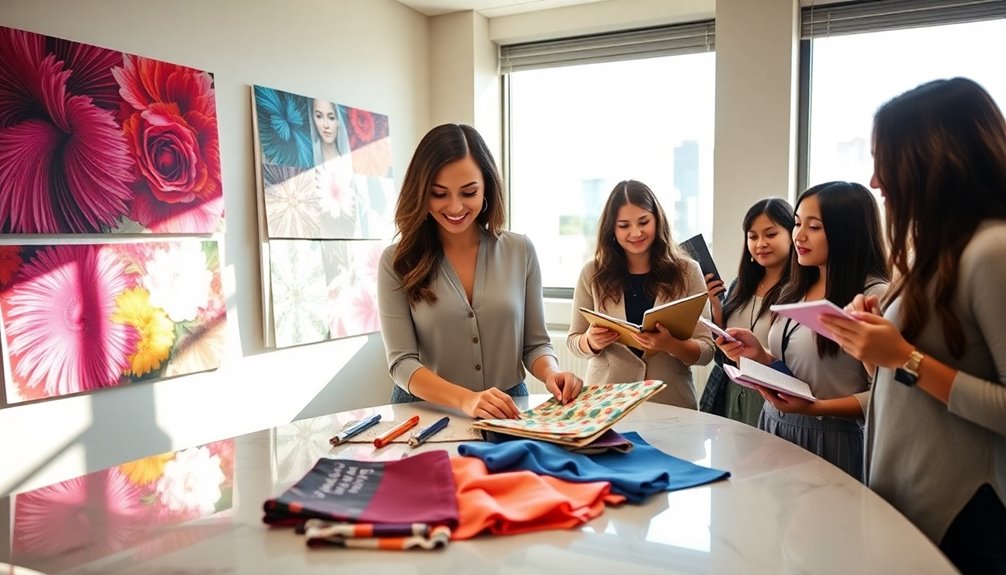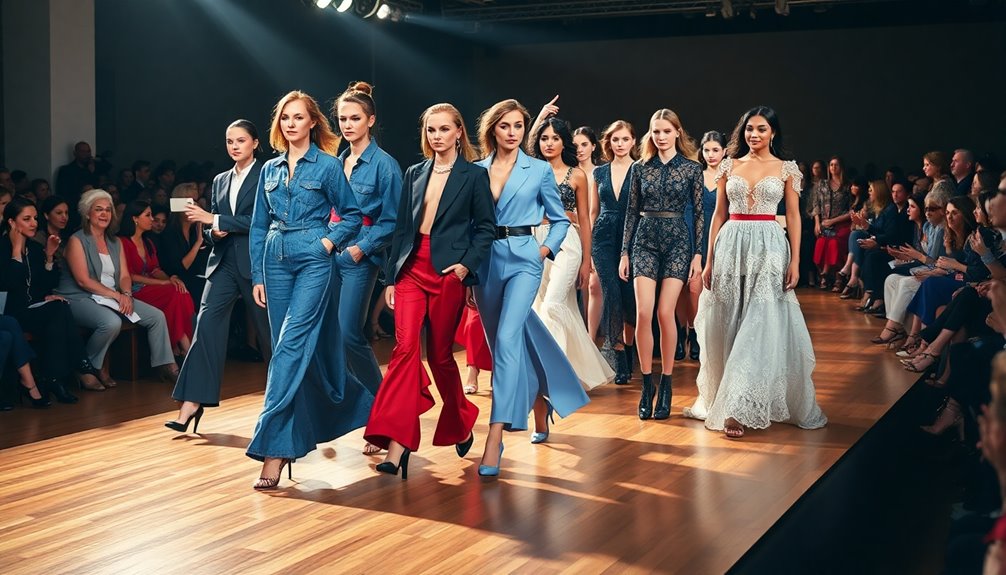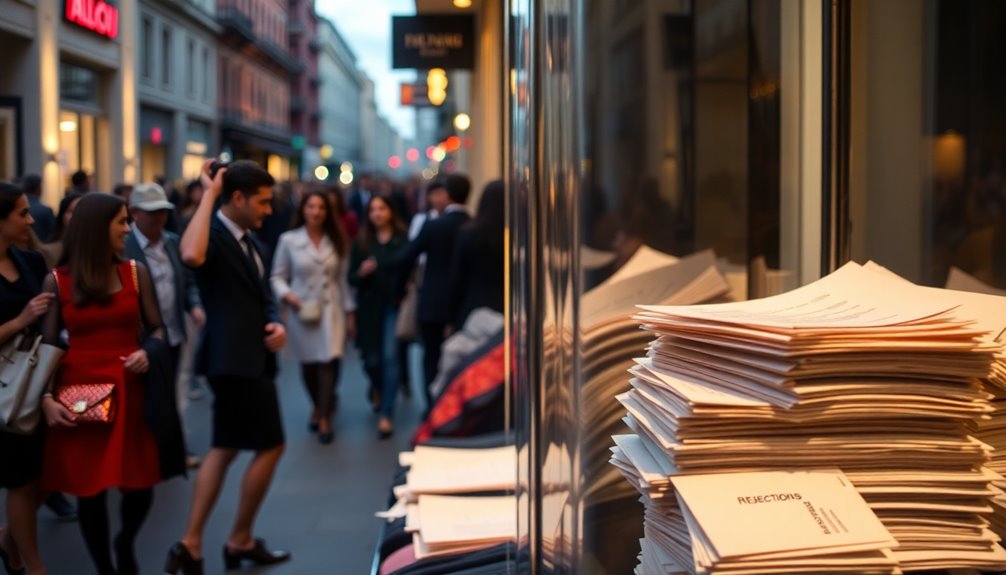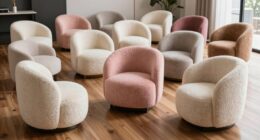Marissa Galante's journey as Fashion Director at Bloomingdale's shows you how to blend passion with perseverance. Start by pursuing internships, just like she did at Michael Kors. These experiences help you discover your interests and build essential skills. Network relentlessly by attending industry events and engaging on social media platforms. Set clear goals and stay committed; patience is key in this fast-paced field. Embrace challenges as opportunities for growth while prioritizing mental well-being and self-care. Galante's path offers valuable lessons that can inspire your journey into fashion, and there's much more to uncover about her insights.
Key Takeaways
- Marissa emphasizes the value of internships for gaining essential skills and discovering true passions in the fashion industry.
- Networking through industry events and social media platforms like Instagram is vital for building relationships and advancing career goals.
- Setting clear, ambitious career goals helps maintain focus and drive in the competitive fashion landscape.
- Adaptability and resilience are crucial for overcoming industry challenges and embracing digital transformation.
- Developing a strong personal brand enhances recognition and opens doors to new opportunities in the fashion world.
Education and Early Influences

Navigating the path into the fashion industry often begins with education and early influences that shape your perspective. While you mightn't major in fashion, studying something like Sociology, as Marissa Galante did at the University of Delaware, can still provide valuable insights into consumer behavior and social trends.
Early exposure to fashion through a sister in the industry can spark interest, even if you initially rebel against it. Your first internships play a crucial role in honing your focus. Marissa began in advertising but quickly realized it wasn't her passion. It was her summer internship at Michael Kors that truly ignited her enthusiasm for fashion. Working with the merchandising and sales team, she discovered her eye for trends and creativity, which ultimately led her to become a Fashion Director at Bloomingdale's.
Having mentors, like a Fashion Director at Bloomingdale's, can guide you through various roles and broaden your understanding of the industry.
Although social media wasn't prevalent during Marissa's early career, the hands-on experience she gained helped her identify her career goals. Embrace each opportunity, trust your instincts, and keep learning—these elements are vital to navigating your journey into fashion.
Path to Bloomingdale's

After discovering her passion for fashion during her internship at Michael Kors, Marissa Galante took her first step into the retail world as an assistant personal shopper at Bloomingdale's. This role was pivotal, as it allowed her to immerse herself in luxury retail while working directly with clients.
She quickly recognized the importance of mentorship, connecting with a Fashion Director at Bloomingdale’s who’d shape her career goals. In this supportive environment, her boss encouraged her to pursue her passion, fostering her growth and confidence. The experience highlighted that small mistakes can lead to significant learning opportunities in professional settings. Throughout her time at Bloomingdale’s, she absorbed valuable kate young career lessons, such as the importance of taking risks and learning from failure. She also learned the power of networking and building strong relationships within the industry. These lessons would shape her future success as she climbed the ranks in the fashion world.
Marissa learned the intricacies of being a Fashion Director through hands-on experience and insights from her mentor. She set a clear goal to achieve this position by age 30, demonstrating her ambition. Notably, the recent appointment of David Thielebeule as men's fashion director at Bloomingdale's further highlights the company's commitment to elevating its fashion leadership.
Building strong relationships within the industry proved essential, as she maintained connections with mentors and former bosses. Marissa also valued the fresh perspectives interns brought, using their insights to stay current with trends.
Trusting her instincts and overcoming challenges helped her navigate the fashion landscape, ultimately positioning her for success in a competitive field. Bloomingdale's was more than a job; it was the launching pad for her remarkable journey in fashion.
Role of a Fashion Director

Marissa's journey from assistant personal shopper to aspiring Fashion Director highlights the multifaceted role that a Fashion Director plays in the industry.
As a Fashion Director, you oversee the creative direction of the brand, ensuring that every sketch, pattern, and prototype aligns with the brand's vision. You engage in trend forecasting to keep your brand competitive, collaborating closely with designers to initiate product development protocols. Additionally, a Fashion Director ensures brand integrity by developing seasonal collections that resonate with target audiences. This includes a keen understanding of seasonal color palettes, which are crucial for capturing current trends and appealing to consumers. A strong brand identity is essential for fostering long-term customer loyalty in a competitive market.
Your role also extends to marketing and brand strategy. You develop and execute seasonal and promotional marketing strategies while managing visual merchandising across various categories. Creating impactful social media campaigns and drafting press releases for fashion events are also key parts of your role.
Operational management is another crucial aspect. You ensure that all activities remain on schedule and within budget, track staffing needs, and manage inventory.
Leading a diverse team of fashion professionals, you communicate essential fashion trends and product features, developing style bibles and sample kits.
Planning visual merchandising for retail events and coordinating showrooms are vital in creating a compelling shopping experience. The role demands creativity, strategic thinking, and strong leadership skills to thrive in the fast-paced fashion world.
Key Responsibilities and Trends

In the fast-paced world of fashion, understanding key responsibilities and trends is essential for anyone aspiring to become a Fashion Director. You'll oversee the development of new collections, ensuring they meet high standards of quality and style.
Collaborating with sales, production, and merchandising teams is crucial for creating commercially successful products. Staying updated on market findings and design trends involves attending trade shows and fashion presentations.
You'll engage in trend forecasting, researching colors, fabrication, style, and silhouette to keep your brand relevant. By conducting market research, you can identify new opportunities and translate those trends into compelling visual storytelling. Additionally, understanding the impact of cultural significance can enhance your approach to design, making it more resonant with your audience.
Your role also involves providing creative direction to art directors and production managers, ensuring a cohesive brand image. Working closely with designers and marketing teams, you'll develop promotional strategies and social media campaigns.
Building relationships with key industry players keeps you informed about industry developments, while overseeing production ensures timely delivery of products.
Lastly, managing the fashion calendar and approving final designs are vital to your responsibilities, as you'll provide regular reports to senior management on collection performance and make necessary adjustments. Fashion directors often analyze market trends to guide design choices, contributing to the overall success of fashion projects.
Overcoming Challenges in Fashion

Navigating the challenges in the fashion industry requires resilience and adaptability. You'll face numerous hurdles, from sustainability issues to changing consumer behavior. The pressure to produce ethically and sustainably is immense, but embracing these practices won't only benefit the planet but also resonate with today's conscious consumers. Additionally, the demand for eco-friendly practices is pushing brands to rethink their production processes and materials. To truly thrive, it's essential to protect your energy amidst the chaos of the industry, allowing you to approach challenges with clarity and focus. Understanding the importance of mental health is crucial, as many in high-pressure industries face emotional dysregulation.
As you dive into this industry, keep an eye on shifting shopping habits, especially during economic uncertainties, and be prepared to pivot your strategies accordingly. Remember that maintaining high vibrational energy during your work can also influence your overall success in the industry, as it helps you align with your goals and aspirations.
Digital transformation is another challenge you can't ignore. Establishing a robust online presence is vital, as e-commerce continues to reshape traditional retail landscapes. Leverage digital tools to enhance supply chain transparency and efficiency while staying relevant in a competitive market.
Lastly, promoting inclusivity and representation is crucial. Advocate for diverse body types and transparent supply chains to challenge outdated beauty standards. Acknowledge the mental and physical health pressures prevalent in fashion; prioritize self-care and set boundaries to maintain balance. Embracing practices that enhance relaxation, similar to the techniques in Law of Attraction, can significantly improve your mental well-being in this fast-paced industry.
Qualities of Ideal Interns

Finding the right internship can be a game-changer in your fashion career. To stand out as an ideal intern, you should embody a mix of essential skills and qualities.
Creativity is crucial; you need to generate fresh ideas that can contribute to your team's vision. Coupled with a sharp attention to detail, you'll ensure that every design element is impeccable.
Time management is vital, especially in an industry with tight deadlines. Familiarity with design software is also a must, as it allows you to execute your visions efficiently. Hands-on experience is also invaluable, as it helps you understand the practical aspects of the fashion industry.
Strong communication skills will help you articulate your ideas clearly and engage with your supervisors and colleagues. Being a team player is essential; you should collaborate well with others and contribute positively to group dynamics.
Adaptability and flexibility are key traits, allowing you to navigate changing project requirements smoothly. Don't forget to keep a positive attitude and a willingness to learn.
Hands-on skills, like sewing and fabric knowledge, are invaluable, as is staying updated on current trends. By showcasing these qualities, you'll position yourself as a sought-after intern ready to make a significant impact in the fashion world.
Importance of Self-Care

Self-care plays a pivotal role in your overall well-being, and fashion can be a powerful tool in this journey. The way you dress influences your mood and confidence, sending a clear message of self-value. When you choose quality clothing, you not only enhance your self-esteem but also create a positive outlook on life. Dressing well can feel therapeutic and mindful, allowing you to express your personal values. Your clothing choices significantly impact your mental health. Wearing nice clothes boosts confidence and helps you feel more prepared for the day ahead. On the other hand, ill-fitting or uncomfortable attire can lead to frustration and disappointment. Self-care fashion promotes health and happiness, reminding us that what we wear is integral to how we feel. It's important to remember that certain oils can also enhance your mood when incorporated into your self-care routine. Regular physical activity is essential for maintaining overall health and can complement your fashion choices by boosting your confidence further. The rise in popularity of clean beauty products supports the idea that self-care extends beyond clothing to overall lifestyle choices. Additionally, incorporating HEPA filtration through air purifiers can contribute to a healthier living environment, further enhancing your well-being. Moreover, wearing comfortable clothing can encourage regular physical activity, making it easier to maintain an active lifestyle.
Sustainable fashion aligns with self-care by promoting comfort and reducing stress associated with fast fashion's environmental impact. Organizing your wardrobe reduces stress and makes daily fashion choices easier. Purchasing clothes you genuinely want to wear ensures satisfaction and enhances comfort.
Work-Life Balance Strategies

Achieving a harmonious work-life balance is essential for your overall well-being and productivity. To foster this balance, consider embracing flexible work arrangements. When your employer offers options like remote work or flexible hours, it allows you to manage personal responsibilities more effectively, reducing stress and boosting job satisfaction. Additionally, maintaining an organized environment can enhance focus and productivity, which are crucial for managing both work and personal life effectively. Incorporating elements of Montessori principles can also create a more independent and focused workspace. Furthermore, the integration of AI security measures can help protect your personal data, ensuring your online safety while you work remotely.
Regular time off is another crucial strategy. Make sure to take breaks and utilize your paid time off. This isn't just a perk; it's vital for maintaining your creativity and energy levels. Remember, a well-rested employee is more focused and capable of handling tasks efficiently. Additionally, competitive compensation can alleviate financial stress, allowing you to focus more on your personal life. Engaging in activities that promote emotional well-being can also enhance your overall balance. Furthermore, establishing clear savings goals can provide a financial cushion that supports your work-life balance.
Promoting a supportive culture at work can significantly enhance your work-life balance. When management leads by example and takes time off, it encourages you to do the same. Open communication with your colleagues and supervisors about work-life balance concerns is essential. Moreover, creating mindful spaces in your work environment can foster a sense of calm and enhance productivity. Including regular team-building activities can also strengthen interpersonal relationships and promote collaboration.
Lastly, don't underestimate the power of celebrating achievements. Acknowledging milestones fosters a positive work environment and keeps morale high.
Advice for Aspiring Fashion Professionals

To thrive in the competitive world of fashion, it's crucial to understand the various paths available and the skills required to navigate them. Start at the bottom; many successful figures in the industry began in low-paid roles. Analyze your past experiences to identify transferable skills that can propel you into areas like fashion merchandising, retail management, or design.
Internships are vital for gaining hands-on experience. They expose you to different aspects of the industry, helping you build essential skills such as organization, communication, and problem-solving. In fact, the global fashion industry is valued at $1.5 trillion annually, highlighting the vast opportunities available. Furthermore, developing a strong personal brand can significantly enhance your brand recognition and open doors to new opportunities. Additionally, remember that emerging roles in AI online jobs can offer unique insights into data-driven fashion analytics. Engaging in daily practices can also help maintain a mindset focused on growth and opportunity. Establishing a solid bedtime routine can also enhance your productivity and creativity by ensuring you are well-rested.
Stay curious and innovative, adapting to cultural shifts and market trends. Networking is also key. Attend fashion shows, workshops, and industry events to meet professionals. Use social media platforms like Instagram and TikTok to connect with others and stay informed about emerging trends.
Build genuine relationships by following up after events, showing interest in others' work, and collaborating strategically to enhance your portfolio. Set clear career goals, like aiming to reach a specific position by a certain age.
Remain positive and self-motivated, embrace challenges, and view each experience as a learning opportunity. Success in fashion requires patience and a willingness to play the long game.
Frequently Asked Questions
What Inspired Your Switch From Advertising to Fashion?
You realized that advertising didn't ignite your creativity like you hoped.
During a summer internship at Michael Kors, you discovered your passion for fashion while working with the merchandising and sales team.
That experience sparked a fire in you, showing how much you loved the industry.
This led you to explore opportunities in fashion, where you could truly express your style and creativity, making the switch feel like a natural progression.
How Do You Stay Updated on Fashion Trends?
To stay updated on fashion trends, you need to blend various strategies.
Start by monitoring social media and online platforms to analyze images and track consumer behavior. Keep an eye on current events and pop culture, as they can spark new trends.
Engage with industry experts and connect with interns for fresh perspectives.
Lastly, leverage historical data and statistical methods to refine your forecasts and adapt to changing market demands.
What Skills Are Essential for Success in Fashion?
To succeed in fashion, you need a blend of creative and technical skills. Master design software and understand fabrics and garment construction.
Business acumen is crucial, so get comfortable with budgeting and market analysis. Strong leadership and communication abilities will help you inspire your team and negotiate effectively.
Finally, stay aware of trends and consumer behavior to keep your designs relevant. Balancing creativity with practicality is key to thriving in this industry.
How Do You Handle Creative Disagreements With Colleagues?
Handling creative disagreements with colleagues requires embracing conflict as an opportunity for growth.
You should establish clear ground rules for discussions, ensuring respect and open-mindedness. Encourage everyone to voice their ideas without fear of judgment and focus on the substance of the conversation.
Foster psychological safety by promoting open dialogue about feelings. By valuing diverse perspectives and actively listening, you can transform disagreements into innovative solutions that benefit the entire team.
What Networking Tips Do You Have for Aspiring Fashion Professionals?
To network effectively in fashion, attend industry events and come prepared with business cards and an elevator pitch.
Engage actively on social media platforms like Instagram and LinkedIn, sharing your work and insights.
Seek mentorship by reaching out to admired professionals and participating in internships for hands-on experience.
Build genuine relationships by staying in touch and showing interest in others' work.
Collaborate and support your peers to create a strong professional network.
Conclusion
In the fast-paced world of fashion, Marissa Galante's journey highlights the importance of education, resilience, and passion. By embracing challenges and prioritizing self-care, you can carve your own path in this dynamic industry. Remember, it's not just about the trends; it's about finding your unique voice. As you pursue your dreams, stay dedicated and open to learning. With the right mindset and persistence, you can thrive in fashion just like Marissa.









